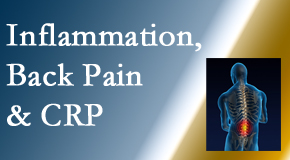Inflammation is an enemy, especially when your body is
trying to heal and/or stay healthy. Your Williamson chiropractor is
quite interested in C-reactive protein levels as they tell the story of
inflammation. (Testing CRP levels is simple. Just a simple Williamson blood
test is required since it’s made in the liver.) Elevated C-reactive protein
levels indicate elevated levels of inflammation in the body. What do spinal discs
do when irritated? Swell. Apple Country Chiropractic knows much about spinal discs, the
spine, and back pain, so naturally, Apple Country Chiropractic is interested in c-reactive
protein levels as one facet of the puzzle of back pain to be considered. Apple Country Chiropractic
clearly sees a link between inflammation, C-reactive protein levels, health and
back pain.
As a matter of fact, elevated C-reactive protein levels can
be quite specific indicators for certain diseases and not just cardiovascular risk
which is a topic for another article. Spine related issues like those
Apple Country Chiropractic sees all the time and C-reactive protein levels include:
- Low bone mineral density: Significantly higher
bone marrow edema (swelling) along with increased C-reactive protein levels and
sacroilitis on xray are indicators for low bone mineral density (BMD). (1) C-reactive
protein concentration was significantly higher in the decreased BMD group. (2)
- Bone loss in post-menopausal women: C-reactive protein levels along with age of
menopause, duration of menopause, serum low density lipid, serum homocysteine, and
neutrophils to lymphocyte ratio levels are risk factors for postmenopausal
osteopenic women. (3)
- Inflammatory back pain: Researchers are considering
how the CRP level might be a reliable indicator of inflammatory back pain. (4)
Now, inflammatory back pain is a concern your Williamson
chiropractor works with successfully. Inflammed discs respond to chiropractic
care nicely. Williamson chiropractic patients find relief for their
back pain and neck pain when the chiropractic treatment plan involves a
multi-faceted approach of chiropractic spinal manipulation with Cox Technic,
nutrition and diet to reduce C-reactive protein levels, and exercise. (5) What
kind of diet and nutrition changes might help? An anti-inflammatory diet is
beneficial: reduce sugar/flour intake, add anti-inflammatory herbs like ginger and
turmeric, increase fish intake or take fish oil supplements. (These suggestions
also tend to help Williamson back pain patients lose weight. A welcome
side-effect!)
So contact Apple Country Chiropractic today. Williamson
non-surgical back pain relief and control of the C-reactive protein level you
may never have even considered an issue before are waiting for you.

"This information and website content is not intended to diagnose, guarantee results, or recommend specific treatment or activity. It is designed to educate and inform only. Please consult your physician for a thorough examination leading to a diagnosis and well-planned treatment strategy. See more details on the
DISCLAIMER page. Content is reviewed by
Dr. James M. Cox I."